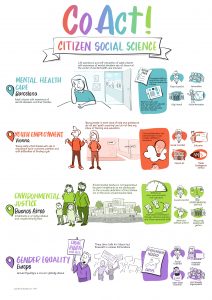CoAct, Co-designing Citizen Social Science for Collective Action Horizon 2020 SwafS project. January 2020 – December 2022.
The world faces serious social fractures that undermine the quality of life of certain collectives. CoAct wants to place people in a vulnerable situation – seldom voiced- at the center of scientific research, to turn them into reliable experts and co-researchers of a participatory study.

CoAct is an ambitious European project that brings together citizen science and the social sciences, while proposing new practices for Research and Innovation(R&I) where citizens become co-researchers. The project develops around four wicked global concerns -such as mental health care, youth employment, environmental justice and gender equity-, distributed and analysed in four specific areas: Barcelona, Vienna, Buenos Aires and Eastern European countries.
CoAct proposes a radically new approach to address these four social issues by defining a general framework for the emerging citizen social science. All CoAct’s R&I actions follow the same model. The model is based on research co-design and co-production carried out by groups of citizens in a vulnerable situation with the help of broad and diverse coalitions of experts formed by researchers, social organizations and public administrations.
This collective effort, both global and local, aims to generate a socially robust knowledge and to recommend scientifically reasoned measures to promote social change. OpenSystems coordinates nine partners from Spain, Germany, Austria, United Kingdom and Argentina.
In Catalonia, the CoAct project focuses on mental health care research with the participation of the FSMC (Federació Salut Mental Catalunya), which brings together 68 entities, and the support of several municipalities and research groups. OpenSystems and the FSMC have previously collaborated in the Citizen Science project Games x Mental Health.
CoAct is a RIA (Research and Innovation Action) that receives funding from the European Commission’s Horizon 2020 program through the SwafS (Science with and for Society) line.
This project has received funding from the European Union’s Horizon 2020 research and innovation programme under grant agreement No. 873048. ![]()
En col·laboració amb:
ZSI (Zentrüm för Soziale Innovation). Àustria
UNIVIE (Universtitat de Viena). Àustria
FHP (Fach Hochschule Postdam). Alemanya
UNSAM (Universidad Nacional de General San Martín). Argentina
OKF (Open Knowledge International). Seu del Regne Unit
GIG ( Global Innovation Gathering). Alemanya
FSMC (Federació Salut Mental de Catalunya). Espanya
FARN (Fundación Ambiente y Recursos Naturales). Argentina